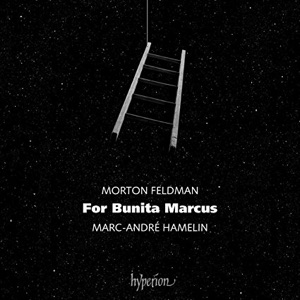For Bunita Marcus is late Feldman, and that means long Feldman. In this performance it lasts about seventy-two minutes, and like most of his late pieces for small forces it consists of short, atonal note groupings that create slowly shifting patterns, all projected at generally soft dynamics. It’s hypnotic, and oddly compelling once you get into it. Silence is just as important as the musical notes: the player has to gauge carefully the amount of time given over to harmonic overtones and the piano’s natural resonance, for these delicate washes of sound contain much of the music’s content and ability to fascinate.
This is precisely Hamelin’s strength. It goes without saying that he has the technique and the concentration to get through the piece without strain, but the tempo he chooses (very similar to that of Hildegard Kleeb on hat[now]ART, and considerably quicker than Sabine Liebner on Oehms) strikes me as ideal to capture the music’s play of tones and textures. I was especially impressed by bar 57. Just kidding. The truth about these late works of Feldman is that there are very few poor performances on disc because, first, the music leaves little room for interpretation in the conventional sense, and second, no one attempts them unless they really know what they are doing. Hamelin certainly knows. Hyperion’s excellent sonics suit the piece beautifully.
































